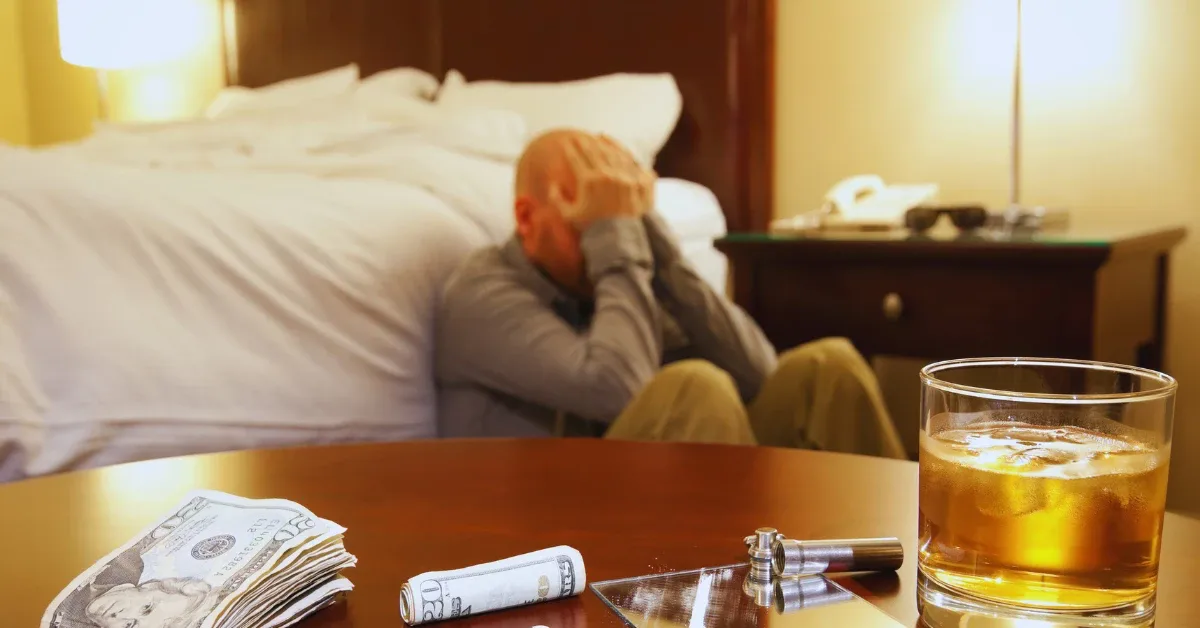the Challenges: Can a Tenant Be Evicted for Drug Use?
A tenant can be evicted for drug use if it breaches the terms of the lease or rental agreement. Drug use is generally considered a violation of the rules and regulations set out in the lease agreement, and can lead to eviction if the tenant does not remedy the situation or comply with the landlord’s requests.
Illegal drug use may cause disturbances, and property damage, and may even put the safety of neighbours or other tenants in danger. Regardless if the activity occurred on the rental premises or elsewhere, landlords have the right to enforce their rental agreements and terminate tenants who break the rules.
However, landlords cannot discriminate against tenants who have a drug addiction or have received treatment for one in the past, as it is classified as a disability under the fair housing act. Depending on the state laws, there may be mandatory steps that landlords must take before initiating an eviction process.

The Basics Of Tenant Eviction For Drug Use

Defining Drug Use And Its Implications For Rental Properties
Drug use can be defined as the act of consuming illegal substances or using prescription drugs without medical authorization.
When it comes to rental properties, drug use can pose significant risks and implications not only for tenants but also for the landlord.
Here are some key points to consider regarding drug use and rental properties:
- Drug use can cause damage to the rental property, putting the landlord’s investment at risk.
- It can also cause disturbances in the neighbourhood, creating a nuisance for other residents.
- Most importantly, drug use can put the lives of the tenants at risk and compromise their safety.
Understanding The Legal Process Of Tenant Eviction For Drug Use
Evicting a tenant for drug use is a legal process that requires careful adherence to specific guidelines.
Landlords must follow some essential steps before proceeding with eviction:
- They must first provide written notice to the tenant, specifying the lease violations and requesting the tenant to remedy the situation within a specific timeframe.
- If the tenant fails to cure the violation, the landlord can file a complaint with the court, specifying the lease violations.
- If the court finds that the tenant has indeed violated the lease agreement, it can order the eviction and provide a specific date by which the tenant must vacate the property.
It is worth noting that eviction for drug use may have different requirements depending on the state and jurisdiction.
Landlords must consult with legal counsel to ensure compliance with applicable laws and regulations.
Discussing When Landlord Recourse Might Be Possible
Recourse for landlords regarding tenant drug use may take different forms.
Depending on the case specifics and lease agreement, landlords may pursue some of the following options:
- Termination of the lease agreement: Drug use violates the terms of most lease agreements, allowing landlords to terminate the lease and request eviction.
- Demanding compensation: Landlords may seek compensation for damages caused by tenant drug use, such as property damage, cleaning costs or legal fees.
- Involving law enforcement: Landlords can contact law enforcement authorities to investigate or arrest tenants for drug-related criminal activities.
It is essential to discuss the available recourse options with experienced legal counsel before taking any action to avoid legal liabilities or breaching tenants’ rights.
The Role Of Tenant Agreements In Drug Use

Can A Tenant Be Evicted For Drug Use?
Renting a property comes with certain rights but also responsibilities, as tenants are required to adhere to the designated tenant agreement.
However, drug use in a rental property can cause significant problems for landlords and their neighbours, leading to eviction in some cases.
Let’s discuss the role of tenant agreements in drug use cases and how they can be leveraged for eviction purposes.
The Importance Of Tenant Agreements In Drug Use Cases
A tenant agreement is a legally binding document between a landlord and tenant that outlines the rules and regulations that both parties must follow during the tenancy.
It is a crucial aspect of renting a property, as it can protect the landlord and tenant from any disagreements or legal issues.
When it comes to drug use, the tenant agreement becomes even more critical as it can determine whether a tenant can be evicted or not.
How Drug Use Can Violate The Tenant Agreement
Most tenant agreements include clauses that prevent tenants from engaging in illegal activities, which can include drug use.
Drug use can also violate other clauses, such as disturbing the peaceful enjoyment of other tenants or causing damage to the property.
Violation of these clauses can lead to eviction, depending on the lease agreement’s terms and the severity of the violation.
Here are some common ways in which drug use can violate the tenant agreement:
- Possession, use, manufacturing, or distribution of illegal drugs on the property.
- Allowing guests to use drugs on the property.
- Damaging the property due to drug use or the manufacturing of drugs.
- Disturbing neighbours’ peace and quiet with loud noises or other behaviours related to drug use.
Discussing How To Leverage Tenant Agreements For Eviction Purposes
If landlords suspect their tenant is using drugs, they should review the tenant agreement to determine if the tenant is violating any clauses.
If the lease agreement includes a drug-free policy, landlords can provide written notice to the tenant that they are in violation of the lease agreement.
This notice should give tenants a specific time frame to cure the violation or face eviction.
Landlords should also document any evidence of drug use, such as drug paraphernalia or witness testimony, to present in court if necessary.
If the tenant does not correct the violation or continues to engage in illegal drug use, the landlord can file for eviction.
Enforcing a drug-free policy is important for landlords to protect their property and ensure a safe environment for all tenants.
Tenant agreements should be reviewed carefully and updated to include drug-free policies.
Additionally, landlords should be vigilant in detecting illegal drug use and take appropriate actions when necessary to maintain a safe and peaceful rental property.
The Risks And Rewards Of Evicting Tenants For Drug Use
The Potential Risks Of Evicting Tenants For Drug Use
Evicting tenants for drug use is a significant decision for landlords. As much as you want to ensure a safe and drug-free environment for other tenants, you must consider the risks involved in the eviction as well, such as:
- Legal repercussions: Evicting a tenant based on drug use alone can provoke legal actions from the tenant, which can be time-consuming and expensive.
- Property damage and lost rent: Drug-addicted tenants might have a higher tolerance for property damage and lost rent, which can result in costly repairs.
- Negative community perception: Evictions for drug use can become public information, hence affecting the community’s perception of the rental property and the landlord.
The Rewards Of Evicting Tenants For Drug Use From A Legal Standpoint
Despite potential risks, there are rewards for evicting tenants for drug use, as well, particularly from a legal perspective. Some benefits that landlords can reap include:
- Clear legal grounds for eviction: When landlords evict tenants for drug use, they have legally sound reasons for their actions, making it easier to defend eviction decisions in court.
- Reasserting control over the property: Drug use within a property can create an unsafe and uncontrollable environment for landlords. Eviction enables landlords to reestablish control over their property.
- Encouraging compliance among other tenants: Other tenants in the community are likely to appreciate eviction actions against drug use, and it might encourage them to comply with community policies.
How Successful Eviction Can Benefit Both Landlords And Tenants
Successful eviction of drug-addicted tenants can bring multiple benefits to both landlords and tenants, including:
- Improved property safety: Landlords can ensure a safe property with little to no risk of drug use. Tenants can feel secure knowing that their landlord takes their safety and well-being seriously.
- Reduced property damage: Eviction of drug-using tenants minimizes property damage, which can reduce repair costs for landlords, and ensure that other tenants live in a clean environment.
- Opportunity to seek treatment: A successful eviction can provide drug-addicted tenants with a wake-up call and an opportunity to seek treatment, which can benefit them and society in general.
Overall, eviction for drug use can be a challenging decision for landlords.
When considering eviction, landlords must weigh the risks against the rewards before taking action.
Frequently Asked Questions For Can A Tenant Be Evicted For Drug Use
Can A Tenant Be Evicted For Drug Use On The Property?
Yes, a landlord can evict a tenant for drug use as it is a violation of the lease agreement and against the law.
What Steps Should Be Taken Before Evicting A Tenant For Drug Use?
Before evicting a tenant for drug use, a landlord should provide written notice and evidence of the drug use with a chance for the tenant to respond.
What Legal Action Can Be Taken Against A Tenant For Drug Use?
A landlord can file an eviction lawsuit against a tenant for drug use and if successful, the tenant will be ordered to move out of the property.
Can A Tenant Dispute An Eviction Notice For Drug Use?
Yes, a tenant can dispute an eviction notice for drug use by responding to the notice and presenting evidence to contest the allegations.
Conclusion
After going through this detailed explanation on the legality of evicting tenants who use illicit drugs, it’s important to note that evicting a tenant on drug-related grounds can be quite tricky, with a lot of legal hoops to jump over.
Landlords must ensure that they follow the guidelines and procedures stipulated by the state in which they operate, and always seek legal advice from a qualified attorney before taking any drastic action.
Tenants, on their part, must bear in mind that drug use is detrimental not only to themselves but also to their neighbors, and take steps to ensure that their habit does not become a nuisance or danger to anyone.